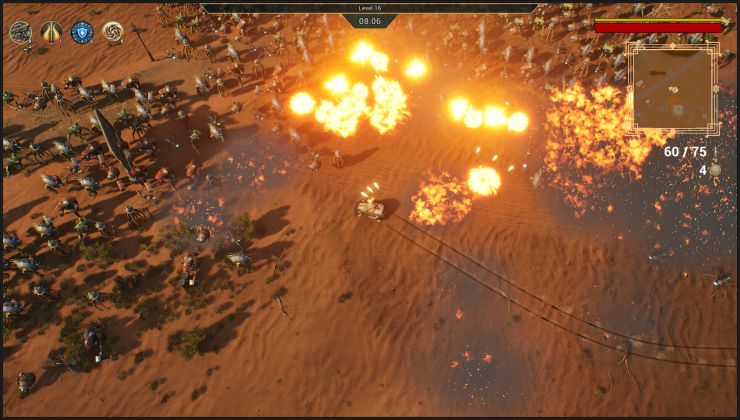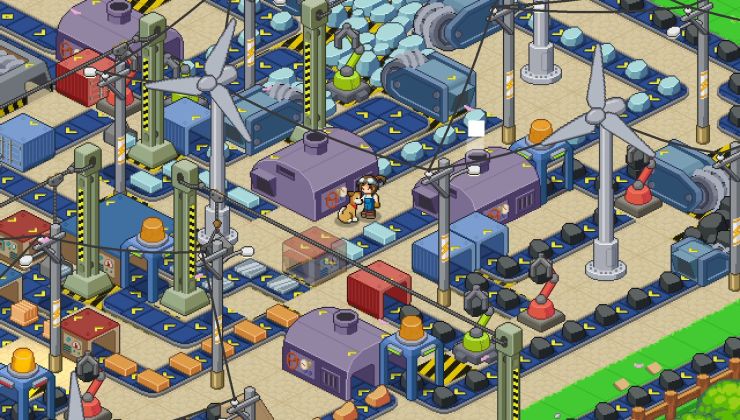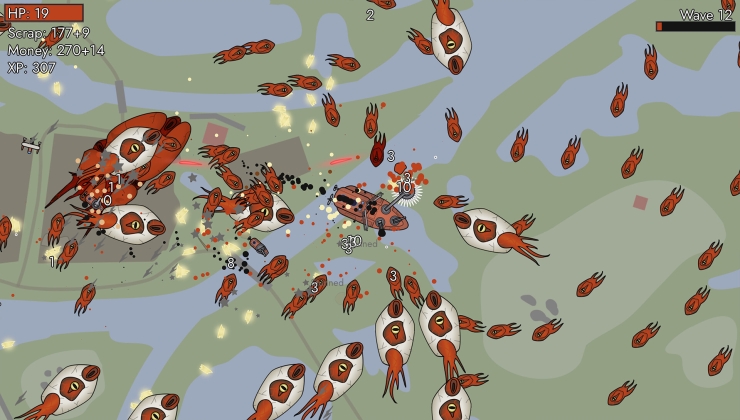Announced recently at the Microsoft E3 conference, "The Last Night" is a "post-cyberpunk", pixel art adventure game inspired by Flashback and Blade Runner that blends traditional pixel art with 3D composition giving the game a very cinematic look. While the game's website doesn't directly mention Linux, the trailer and the game's Steam page clearly mentions SteamOS as one of the target platforms.

The game is described as an alternate take on the cyberpunk genre, based on a 6-day prototype from 2014's #cyberpunkjam (playable on Linux), with the following text providing the outline of the story:
While this does sound like an interesting take on cyberpunk, paired with tweets from a few years ago by one of the game's creators, Tim Soret, it might not be something everyone is entirely comfortable with. Rock, Paper, Shotgun has collected the relevant links if you want to know more.
No matter the influence or importance of those tweets, this sure looks like a game to keep an eye on.

YouTube videos require cookies, you must accept their cookies to view. View cookie preferences.
Direct Link
Direct Link
The game is described as an alternate take on the cyberpunk genre, based on a 6-day prototype from 2014's #cyberpunkjam (playable on Linux), with the following text providing the outline of the story:
QuoteHumans first knew the era of survival. Then they knew the era of work. Now they live in the era of leisure. Machines have surpassed human labour not only in strength, but in precision, intellect, and creativity. Stabilised by universal income, people struggle to find their calling or identity, and define themselves by what they consume, rather than what they create.
The Last Night immerses you in the everyday life of Charlie, a second-class citizen living in a city brimming with augmentation and citizens living a gamified existence — none of which Charlie can experience himself due to a childhood accident. Apathetic and disheartened by the seemingly pointless world around him, Charlie is presented with an opportunity to take matters into his own hands. But at what risk?
While this does sound like an interesting take on cyberpunk, paired with tweets from a few years ago by one of the game's creators, Tim Soret, it might not be something everyone is entirely comfortable with. Rock, Paper, Shotgun has collected the relevant links if you want to know more.
No matter the influence or importance of those tweets, this sure looks like a game to keep an eye on.
Some you may have missed, popular articles from the last month:
All posts need to follow our rules. For users logged in: please hit the Report Flag icon on any post that breaks the rules or contains illegal / harmful content. Guest readers can email us for any issues.
Kinda looks like some pimped up Sierra game from the old days. Looks really weird and cool at the same time but I like what I see.
0 Likes
Awesome, most intriguing game of E3! <3
Totally reminds me of Flashback (1992)
Totally reminds me of Flashback (1992)
4 Likes, Who?
This is beautiful!
0 Likes
This was one of the games that appealed to me by the look they created. I had already mostly dismissed it because it was announced in the M$ presentation. Good to see that it may actually come after all.
2 Likes, Who?
You had me at Flashback and Blade Runner. I'm in!
2 Likes, Who?
Oh wow - what a fantastic art style! And this is coming from someone who are allergic to the "retro" thing. But this... Seems to be just the perfect blend.
Let's hope the actual content is as good as the coating!
Let's hope the actual content is as good as the coating!
0 Likes
During the Microsoft event , two games got my attention.
The Last Night and Metro Exodus.
I hope Metro comes too , i have Metro Redux series and they're running great.
The Last Night and Metro Exodus.
I hope Metro comes too , i have Metro Redux series and they're running great.
4 Likes, Who?
Would be great if this site could just not parttake in the outrage-baiting "cleanse the industry of wrongthing" nonsense at all.
2 Likes, Who?
I really dig the art style and the animation. I'm looking forward to it! It's a good thing that so many Microsoft titles are released and coming for Linux/SteamOS.
I hope that this game does not jump onto the "Automation is evil!" bandwagon. Not that a medium should not be allowed to portray a possible future in that way, but I wouldn't particularly like it if the game world would practically send the message that automation and universal income are generally bad things. My point of view is that people will create even more, not less - while they have more time to consume the stuff other people created. I think FOSS-software, -art and -hardware will play an important role in such a future.
Now they live in the era of leisure. Machines have surpassed human labour not only in strength, but in precision, intellect, and creativity. Stabilised by universal income, people struggle to find their calling or identity, and define themselves by what they consume, rather than what they create.
I hope that this game does not jump onto the "Automation is evil!" bandwagon. Not that a medium should not be allowed to portray a possible future in that way, but I wouldn't particularly like it if the game world would practically send the message that automation and universal income are generally bad things. My point of view is that people will create even more, not less - while they have more time to consume the stuff other people created. I think FOSS-software, -art and -hardware will play an important role in such a future.
1 Likes, Who?
It reminds me of the game Another World too. Ill buy it if there's a Linux port.
0 Likes
I really dig the art style and the animation. I'm looking forward to it! It's a good thing that so many Microsoft titles are released and coming for Linux/SteamOS.
Now they live in the era of leisure. Machines have surpassed human labour not only in strength, but in precision, intellect, and creativity. Stabilised by universal income, people struggle to find their calling or identity, and define themselves by what they consume, rather than what they create.
I hope that this game does not jump onto the "Automation is evil!" bandwagon. Not that a medium should not be allowed to portray a possible future in that way, but I wouldn't particularly like it if the game world would practically send the message that automation and universal income are generally bad things. My point of view is that people will create even more, not less - while they have more time to consume the stuff other people created. I think FOSS-software, -art and -hardware will play an important role in such a future.
I like that you have such a positive and idealistic world view, it's endearing and I read this belief a lot on the web.
But we don't live in a digital-socialistic utopian society, we live in a "late stage" (i.e the winners have almost already taken all ) capitalist industrial society . Right now the average citizen does not control the means of mass production, only smaller business and the self employed have a future by offering a niche human service with boutique products but that won't fill the wage gap.
So we have a 'solution' called UBI and this is mostly just glorified word for State benefits / welfare. This poses the problem of where you actually find the money to fund hundreds of millions of people with tens of thousands of $ per person.. is the private company going to pay for it ? Is the foreign company going to pay for nationals to live for free in other parts of the world with different sovereignty ? Are billionaires and soon to be trillionaires going to share their wealth ?
What you describe or are hoping for is some sort of utopian quasi-communism to save the day, in a reality where communism doesn't fail hard .. Good luck. Then again democracy isn't 'perfect' either.
BTW this game looks awesome, love the aesthetic ^_^
Last edited by on 17 June 2017 at 9:25 am UTC
0 Likes
A good linux game , at a MS presentation .... whelp , there's irony for ya.
0 Likes
I like that you have such a positive and idealistic world view, it's endearing and I read this belief a lot on the web.
But we don't live in a digital-socialistic utopian society, we live in a "late stage" (i.e the winners have almost already taken all ) capitalist industrial society . Right now the average citizen does not control the means of mass production, only smaller business and the self employed have a future by offering a niche human service with boutique products but that won't fill the wage gap.
So we have a 'solution' called UBI and this is mostly just glorified word for State benefits / welfare. This poses the problem of where you actually find the money to fund hundreds of millions of people with tens of thousands of $ per person.. is the private company going to pay for it ? Is the foreign company going to pay for nationals to live for free in other parts of the world with different sovereignty ? Are billionaires and soon to be trillionaires going to share their wealth ?
What you describe or are hoping for is some sort of utopian quasi-communism to save the day, in a reality where communism doesn't fail hard .. Good luck.
BTW this game looks awesome, love the aesthetic ^_^
I'd agree that there seems little chance the uberwealthy are going to be willing to share any of their stuff, that they will in fact go to extreme lengths to avoid having to do so, and indeed are already demonstrably willing to live with the recessions and instability that accompany lack of demand in the economy as long as their share gets more lopsided.
And actually a paternalistic solution in which current trajectories of automation and dissociation of people from the economy proceed apace but we make up for it by giving everyone a wage unrelated to anything doesn't really appeal to me. But that doesn't actually mean it wouldn't work. Communism doesn't actually fail hard. It's not a system I support but there's no reason to be unrealistic, pretending it failed hard is just American mythmaking. It just lost, but that's not the same thing. Traditionally backward Russia and some ramshackle Eastern European and Balkan countries even making things look like a contest for decades against all the big colonial industrialized powers on two continents is pretty surprising. Sure, the USSR had some stagnation happening in the later years--but that was to a fair extent down to the Cold War, which ate up ridiculous amounts of their budgets and talented people. And despite that, most of the countries from the USSR have, after 25+ years, seen things get significantly worse, rather than better, under capitalism. Meanwhile Cuba, despite an intense campaign by the US to nobble them for over 50 years, is to this day clearly a better place for the average bloke to live than any other island in the Caribbean or little Central American country. When you consider that not only does the US refuse to trade with them but it also comes down on anyone else who does, Cuba's economy, let alone education system and so on, is really pretty amazing. Does a bureaucratic, central-planning-based model have its problems? Sure, ask anyone working at a megacorporation. But can it work? Yeah.
Still not my cup of tea. I prefer something more bottom-up, more "protagonistic" as the Bolivarians would say. But I'm not going to pretend it can't work.
2 Likes, Who?
I saw this trailer some time ago because of the whole Gamergate thing and immediately thought it would never come to Linux. Now I'm even more exited. I'll buy it if it has a fair price, specially considering the dev's tweets.
0 Likes
Would be great if this site could just not parttake in the outrage-baiting "cleanse the industry of wrongthing" nonsense at all.
I don't understand what this means? "cleanse the industry of wrongthing"?
1 Likes, Who?
SOLD!
0 Likes
Communism doesn't actually fail hard.Tell that to the 100Million people killed by Stalin.
0 Likes
Man, this looks great. So Flashback.
1 Likes, Who?
Pumped!
0 Likes
I'd agree that there seems little chance the uberwealthy are going to be willing to share any of their stuff, that they will in fact go to extreme lengths to avoid having to do so, and indeed are already demonstrably willing to live with the recessions and instability that accompany lack of demand in the economy as long as their share gets more lopsided.
indeed. Capitalism is just a tool that once again is corrupted by human nature via Corporatism. No system is perfect.
Communism doesn't actually fail hard. It's not a system I support but there's no reason to be unrealistic, pretending it failed hard is just American mythmaking
Communism is an idealistic system which on paper offers many things that other systems do not. But the issue is that the paper is burned by the basic desires and drives of human nature which cannot be avoided. Even an ideal system can be flawed if everyone is not willing to play by the same exacting rules.. it's the enforcement of those rules that has caused many millions of deaths and low standards of living.
There is no perfect system.
0 Likes











See more from me